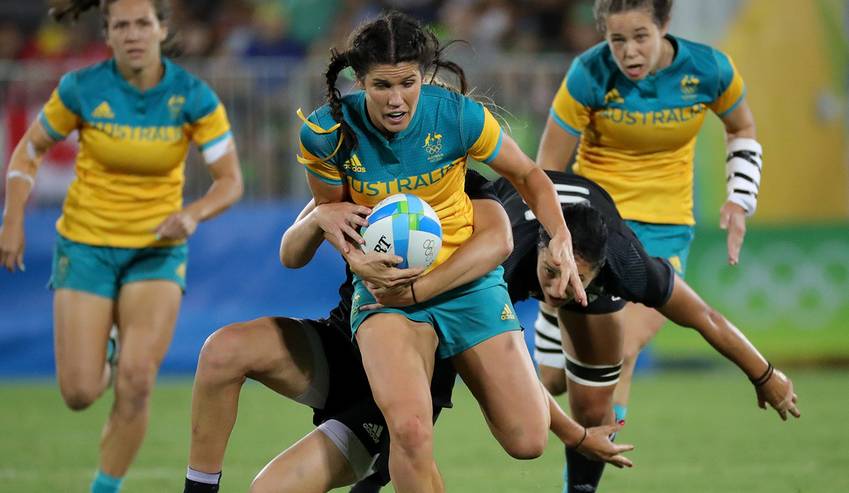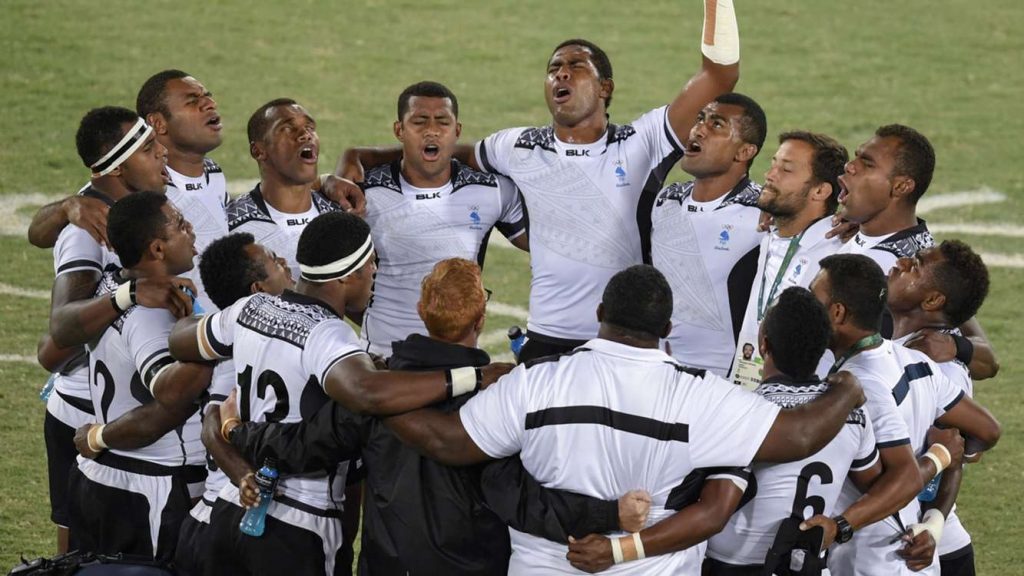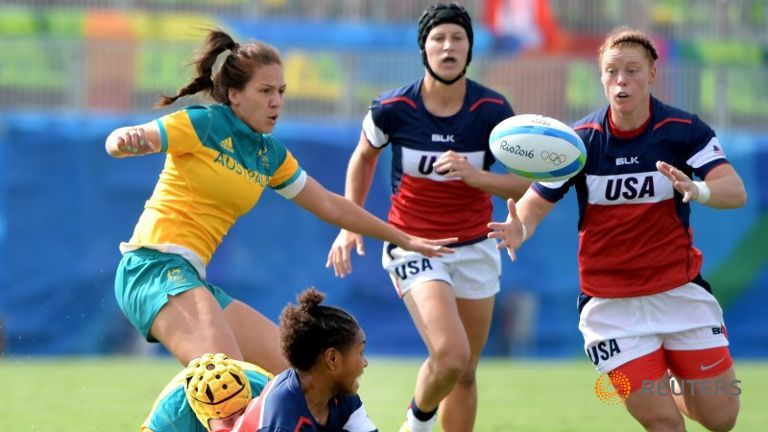
Rugby’s return to the Olympics this summer – after a 92-year absence – ended, figuratively speaking, in an exhilarating run to the try line followed by a touch down between the posts. If any International Olympic Committee (IOC) members were undecided over the sport’s claim to a core place in the Games, the drama and excitement of the sevens game appears to have converted them.
As Bill Beaumont, newly installed Chairman of World Rugby, recalled: “Whenever I met an IOC member in a hotel restaurant or lift during the first week in Rio they would quickly look down at my accreditation to see who I was and usually say nothing. But after Fiji won, well, everybody wanted to congratulate me on the amazing tournament.”
Fiji’s first Olympic medal of any color was celebrated back home with wild joy. In the capital of Suva, revelers danced on streets and rooftops after watching the concluding 43-7 triumph over their former colonist, Great Britain, on big screens around the city center.

It was one of the performances that will be most fondly remembered when people look back to the Rio Games – and Australia’s imperious progress to gold in the women’s sevens tournament will also come readily to mind.
While Beaumont may have provided anecdotal evidence of what the Rio experience has done for rugby sevens, and by extension the overall sport, World Rugby can now back up that optimism with solid figures and incontrovertible evidence of expansion.
Online research conducted before and after the Rio Games by Nielsen Sports in the six core markets of Australia, France, Germany, Japan, the United Kingdom and the United States indicated that the first Olympic rugby tournament since 1924 attracted nearly 17 million new fans.
It also found that Olympic status had increased the sport’s reach, particularly with women and the 18-24 age group. Indeed, the figures suggested that rugby outperformed other sports on the Olympic program in terms of growth in interest after Rio 2016, with an average increase of 10 percent.
Within the UK the research found that nearly four in 10 18-24s watched on television as Britain’s men claimed silver and its women lost the bronze medal match.
Meanwhile, World Rugby reported that its social media fan-base grew by 670,000 during 2016.
World Rugby also announced this week that the IOC’s Olympic Channel and international digital terrestrial television and pay-television broadcaster CNN have signed up as new rights partners for the upcoming 2016-17 HSBC World Rugby Sevens Series which starts in Dubai on Friday (December 2).
The Series is due to be broadcast to more than 100 countries and territories around the world.
World Rugby’s chief executive Brett Gosper commented: “Rugby’s return to the Olympics has been a game-changer, with more than 16 million new fans following our sport after the exciting and entertaining events in Rio last August.
“Next week’s tournament in Dubai marks the start of the Tokyo 2020 Olympic cycle and building on last season, which was the most widely viewed and engaged series ever, we expect more fans from around the world to view and interact with the Series.”
Given that the Rugby World Cup will have been held in Japan a year earlier, the Tokyo 2020 Games look likely to mark another triumphal step for the sport. But there are no guarantees yet of Olympic inclusion beyond then – the question of future involvement will be settled at next year’s IOC Session in Lima from September 10 to 20.

Those dates are clearly imprinted on Gosper, the 57-year-old former Melbourne and Racing Club de France player who took over his current position in 2012.
But Gosper – whose father, Kevan, is a former vice president of the IOC – remains sanguine about rugby’s prospects of remaining in the Olympics.
“It would have been great to start in London 2012, but it wasn’t to be,” he told insidethegames. “But introducing rugby sevens to the Olympics in Rio meant we were able to stimulate new interest in the game in new areas.
“The men’s competition ended up as a fairy tale story – we had semi-finalists from four different regions, and Fiji ended up winning to claim their first Olympic medal of any color. Any story from within our sport that finds its way outside our sport is a bonus – and we couldn’t have hoped for more than what Fiji gave us in Rio.
“I think it was good both for rugby and the Olympics. Most of the IOC members were initially not used to fitting into rugby programs, but many of them came to watch and they were soon on the edge of their seats.
“Sevens is a simplified, high-density version of the 15s game, involving very short, intensive, fluent matches that give a very good idea of what rugby is. It employs broadly the same rules as the 15s game, and on a given day you can see each team involved playing twice.
“It is a much easier game to follow. The 15s game can take some time to appreciate fully. Sevens is much easier to understand and is ideal for an Olympic audience which is likely to be interested in the Olympics first, and in individual sports after that.
“We have been planning for our Olympic return since 2009 and for us and the world rugby community it was hugely important that it went well. We had to make a good start because we don’t want this to be a short exercise. We plan on staying in the Olympic Games beyond Tokyo 2020. We see ourselves as a strong element in the Olympic Movement, which is in turn hugely important for us.
“The Olympics gives us three things. Firstly we get huge audience figures which grow our fan base and increase worldwide interest in the game.
“Secondly, once you are an Olympic sport you find yourself getting onto the curriculum of schools and universities. We have already found this to be true in the United States, Russia and China. We wouldn’t get a look-in in some of these areas if we weren’t a recognized Olympic sport.
“We also benefit from the money that comes into the sport from National Olympic Committees, the Olympic Solidarity fund and national Governments, much of it intended to support athletes as they seek gold, silver and bronze.”
When rugby sevens made its Commonwealth Games debut in Kuala Lumpur in 1998, I was fortunate enough to witness the excitement it generated, in particular through a final which saw Jonah Lomu propel New Zealand to victory over Fiji before leading a rare post-match haka.
Men’s rugby sevens has been part of the Commonwealth Games ever since (with the women’s version due to make its debut at the Gold Coast Games of 2018). But the return of rugby to the Olympic arena for the first time since the Paris Games of 1924 – when the victorious US team required police protection at the medal ceremony after beating the hosts in the final at the Colombes stadium – has not been swiftly achieved.
“My sense is there may have been sensitivity over players’ numbers, and that it has taken a while for the IOC to get a good sense of our sport and a confidence that it can be a good fit with the Games,” Gosper speculated.
“But many IOC members have now witnessed the positive nature of sevens tournaments in places like Hong Kong and Dubai as well as in the Commonwealth Games and I think they have come to realize that it can be a very strong product in terms of the Olympics.
“There may have been some nervousness about how things would work out on the pitch, but we have always been very confident of this product. It has been thoroughly tested down the years all over the world through the World Series, and before the Rio Games we had hugely successful competitions in the Pan-Am and Commonwealth Games.”
Looking ahead to the Lima IOC Session, Gosper is keeping an open mind.
“It depends what Lima is about,” he said. “We get the sense that sports which are now part of the Olympics will be treated pretty equally.
“I think the IOC will make a collective decision about all the sports. I think we have to be ready to have a conversation with them about future inclusion, but I think the IOC members will make that call for themselves. I think they already have enough information and experience in terms of our sport’s Olympic appeal. That’s what we are hoping.”
Part of the information that will inform the IOC debate on rugby’s future within the Movement will have been gleaned from the online work of Neilsen Sports in the six major market areas of the sport.
“It’s a kind of annual dipstick to measure interest,” Gosper said. “The main issue is the number of fans, but we also gauge their attitude to the players’ welfare.
“We use it to estimate the new fans coming into the sport. For instance, one of the forms used has a top line of ‘I am very interested in rugby’ and the second line is ‘I am interested in rugby’…
“There was a big uptake from a range of relatively new territories such as the United States, Germany, Holland and areas of South America and Asia. For us it was excellent in terms of widening the development of the game.”
As you might expect, the recent high profile successes enjoyed by the sport have generated funds that will be directed at making it even stronger and more attractive.
“We are reinvesting the income we get from the Rugby World Cup, the HSBC World Rugby Sevens Series and the Olympic revenue back into the game,” Gosper said.
“We anticipate spending about $306 million in the next Olympic cycle, which is about 22 per cent up on the previous four-year cycle. That money will be going to the grass roots of the sport, and part of it will be directed at creating a second tier of men’s teams in our HSBC Sevens Series.
“It’s not going to be practical to introduce that this coming season, but I’m confident we can do it within the next four-year cycle, and probably in time for the 2017-18 season. We would also be looking at relegation and promotion between the two tiers, depending on how we end up dividing them.
“It’s likely that we will stick with our current core of 16 top nations and have a smaller tier beneath that. That is likely to engage promising nations such as Germany, Brazil and maybe Russia.
“I think there’s lots of add room left in terms of rugby sevens’ geographic footprint. I also think the future will see a lot more local and regional tournaments. And teams like Germany, China, Brazil and Russia will soon be knocking on the door to the top events.
“And the sooner such countries have the possibility of involvement in the Olympics, the more investment will be made into their rugby.
“We are expecting huge interest at Tokyo 2020 just a year after we have held the Rugby World Cup in Japan.
“If the 2024 Games go to Paris – France has probably the largest commercial rugby market. If they go to Los Angeles, then they are going to the United States, where rugby is the fastest growing team sport. If they go to Budapest, that would also provide us with great opportunities in new areas.”

Gosper identifies the women’s game as one of the most dynamic areas within the sport.
“We are seeing numbers in terms of overall participation in sevens around the world at about eight million,” he said. “We estimate that around 30 per cent of those are women, and over the next five to 10 years we would expect that to rise to around 40 per cent.
“That’s where most of the growth will come from. There’s a debate about how quickly that will happen, but we estimate it will go a percentage point every year. I don’t know at what point that growth will flatten out, but we are seeing a huge rise of participation and interest in the women’s game, particularly since the Olympics.”
The women will be involved along with the men next week as their HSBC Series also kicks off in Dubai, with four subsequent tournaments scheduled in Sydney, Kitakyushu in Japan, Langford in Canada and Clermont-Ferrand in France.
“We will be looking to add a sixth tournament to the women’s program,” Gosper added. “This year we will have two tournaments where the men and women will be involved.
“Sydney stepped up to the plate to put on an event which will involve Australia’s winners of the female Olympic title, and Dubai will also feature competition for both the men and the women.
“Expanding on that will take a little time, although that is our intention.”
In the meantime, Gosper is looking forward to the Rio Olympic effect re-invigorating a World Sevens Series that, as with last season, will comprise ten tournaments around the world with the concluding action in London on May 20 and 21.
“In terms of this year’s HSBC Series we are going to see a lot of the stars of Rio returning to the competition,” Gosper said.
“For instance, six of the Fiji gold medalists are due to be in the squad that will defend the men’s title this season.
“I think we will see this year a lot of Olympic medalists, and a lot of Olympic medalists who are happy to flaunt their medals.
“I think sevens can only gain from that.”
By Mike Rowbottom
Republished with permission from insidethegames.biz.